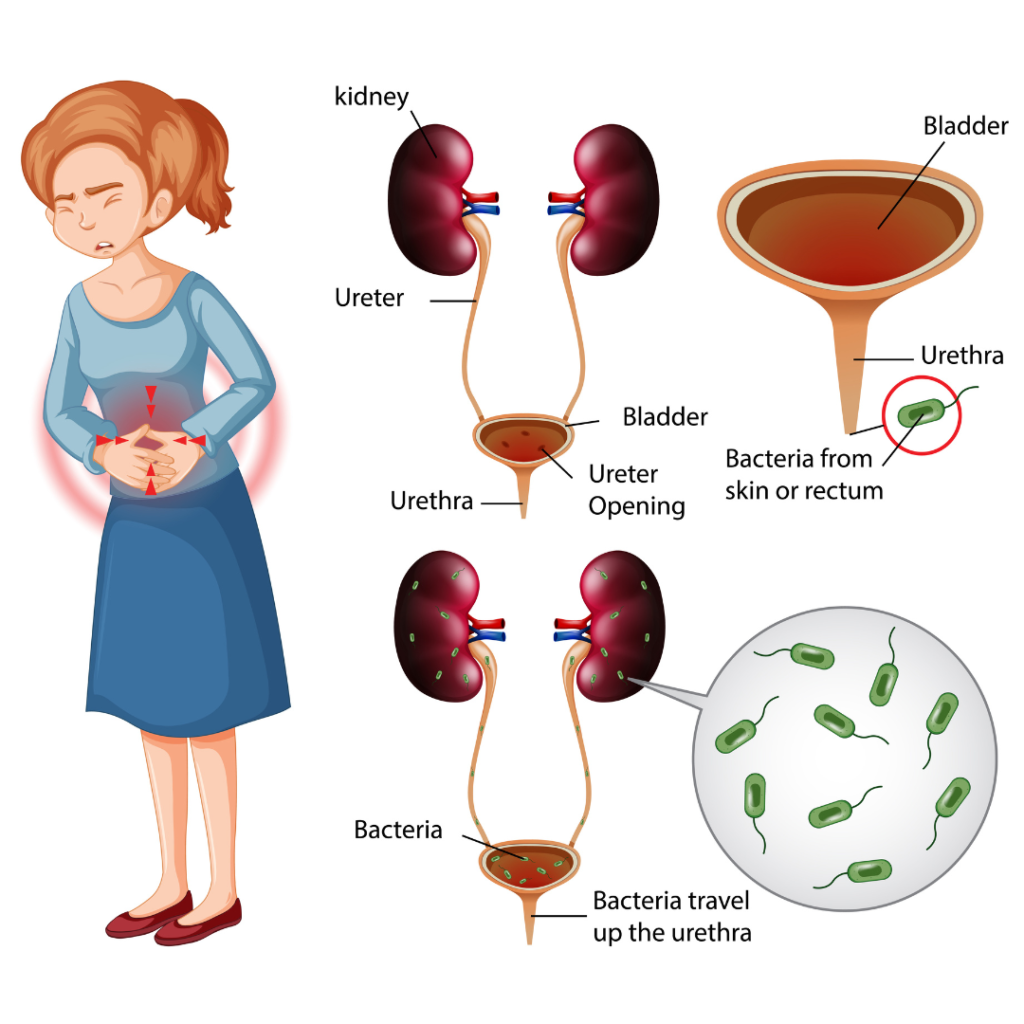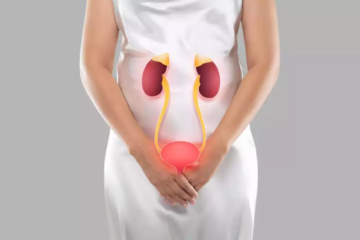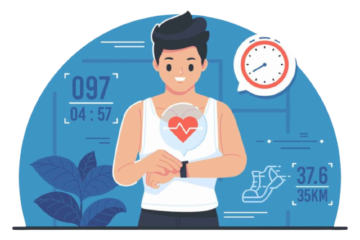
Urinary tract infections (UTIs) are a common and uncomfortable problem that can affect people of all ages and genders. These infections occur when bacteria enter the urinary system and multiply, leading to inflammation and infection. UTIs can affect any part of the urinary tract, including the kidneys, bladder, ureters, and urethra, and can cause a range of symptoms such as pain and burning during urination, frequent urination, and lower abdominal pain. While UTIs are more common in women, they can also affect men, and they can become a recurrent problem if not properly treated. In this blog, we will explore the causes, symptoms, risk factors, and treatment options for UTIs.
Causes of UTIs
- The most common type of bacteria that causes UTIs is E. coli, which is normally found in the intestinal tract but can enter the urinary tract through the urethra.
- Other types of bacteria that can cause UTIs include Klebsiella, Proteus, and Pseudomonas.
- Certain medical conditions such as diabetes, kidney stones, and an enlarged prostate can increase the likelihood of developing UTIs.
- Sexual activity can also increase the risk of UTIs, as can the use of certain types of birth control, such as spermicides and diaphragms.
- Women are more prone to developing UTIs due to the short length of their urethra, which makes it easier for bacteria to enter the urinary tract.
- Holding urine for too long, not drinking enough fluids, using irritating products such as bubble baths and feminine hygiene sprays, and wearing tight-fitting clothing can also increase the risk of UTIs.
- People with weakened immune systems, such as those with HIV/AIDS or those undergoing chemotherapy, may be more prone to developing UTIs.
Symptoms of UTI
The symptoms of a urinary tract infection (UTI) can vary depending on the affected area of the urinary system, but common symptoms include:
- Pain or burning sensation during urination
- Frequent urination
- Strong and persistent urge to urinate
- Passing small amounts of urine at a time
- Cloudy or strong-smelling urine
- Blood in the urine
- Lower abdominal or pelvic pain
- Fever or chills (in more severe cases)
In older adults or individuals with weakened immune systems, UTIs can sometimes present with atypical symptoms such as confusion, agitation, or a sudden change in behaviour. In some cases, UTIs can be asymptomatic, meaning that the individual may not experience any noticeable symptoms.
Prevention:
- Stay hydrated – Drinking plenty of water helps to flush out bacteria from the urinary tract. Aim for at least eight glasses of water per day.
- Urinate frequently – Holding urine in the bladder for too long allows bacteria to multiply, increasing the risk of UTIs. Try to urinate every 2-3 hours.
- Wipe front to back – When using the bathroom, always wipe from front to back to avoid transferring bacteria from the anus to the urethra.
- Wear loose-fitting clothing – Tight-fitting clothing can trap moisture, creating a breeding ground for bacteria. Opt for loose-fitting clothes, especially when spending long hours outdoors.
- Avoid using irritating products – Some feminine hygiene products can irritate the urethra and increase the risk of UTIs. Avoid using douches, powders, and other products that can cause irritation.
- Use the restroom after sex – Sexual activity can push bacteria into the urethra. Urinating after sex can help to flush out any bacteria that may have entered the urinary tract.
- Take showers instead of baths – Bathwater can contain bacteria, increasing the risk of UTIs. Taking a shower instead of a bath can reduce the risk of infection.
Treatment:
- Drink plenty of water – Drinking water helps to flush out bacteria from the urinary tract. Aim for at least eight glasses of water per day.
- Take over-the-counter pain relievers – UTIs can cause pain and discomfort. Over-the-counter pain relievers such as ibuprofen and acetaminophen can help to relieve these symptoms.
- Use a heating pad – Applying a heating pad to the lower abdomen can help to reduce pain and discomfort caused by UTIs.
- Take antibiotics – UTIs are usually treated with antibiotics. Your doctor may prescribe a course of antibiotics to help clear up the infection.
- Avoid irritants – Some products such as bubble baths, scented soaps, and powders can irritate the urethra, making UTIs worse. Avoid using these products until the infection has cleared up.
Conclusion:
UTIs can be a painful and uncomfortable problem, but there are steps you can take to prevent and treat them. By staying hydrated, urinating frequently, wearing loose-fitting clothing, and avoiding irritating products, you can reduce your risk of developing UTIs. If you do develop a UTI, be sure to drink plenty of water, take over-the-counter pain relievers, and see a doctor if necessary. By following these tips, you can enjoy a summer free from the discomfort of UTIs.
Dr. Sumit Sharma is an experienced urologist, andrologist, and kidney transplant surgeon with over 20 years of clinical experience. He is the founder of the Department of Urology at multiple hospitals in Gurgaon and has established successful kidney transplant programs across the city.
Here are frequently asked questions about UTIs:
Q. What foods prevent UTIs?
While there is no one specific food or diet that can completely prevent urinary tract infections (UTIs), there are certain foods and dietary habits that may help reduce the risk of developing UTIs. Here are some examples:
- Drink plenty of water: Staying hydrated helps to flush bacteria out of the urinary system, reducing the risk of infection.
- Eat foods rich in probiotics: Probiotics are beneficial bacteria that can help maintain a healthy balance of bacteria in the gut and urinary tract. Foods rich in probiotics include yogurt, kefir, kimchi, and sauerkraut.
- Incorporate foods high in vitamin C: Vitamin C can help to acidify the urine, making it less hospitable to bacteria. Foods high in vitamin C include citrus fruits, berries, kiwi, peppers, and broccoli.
- Avoid or limit foods and drinks that can irritate the urinary tract: Certain foods and drinks, such as alcohol, caffeine, spicy foods, and acidic foods (e.g., tomatoes, and oranges), can irritate the urinary tract and potentially increase the risk of infection.
- Include garlic in your diet: Garlic has antimicrobial properties and may help prevent the growth of bacteria. Incorporating garlic into your diet by adding it to meals or taking supplements may help reduce the risk of UTIs.
It is important to note that dietary changes alone may not completely prevent UTIs, and individuals with a history of UTIs or other risk factors should still take precautions to reduce their risk of infection, such as practising good hygiene and seeking prompt medical treatment if symptoms occur.
Q. Who is the best urologist in Gurgaon?
Dr. Sumit Sharma is an experienced urologist, andrologist, and kidney transplant surgeon with over 20 years of clinical experience. He is the founder of the Department of Urology at multiple hospitals in Gurgaon and has established successful kidney transplant programs across the city.
Q. How can I test for UTI at home?
There are a few home UTI test kits available on the market that allow individuals to test for a UTI in the comfort of their own homes. These test kits usually involve collecting a urine sample and using a dipstick or test strip to check for signs of infection, such as the presence of nitrites or leukocytes in the urine.
However, it is important to note that home UTI test kits may not be as accurate as tests performed in a medical laboratory. False negatives and false positives can occur, and it is possible to have a UTI even if the test results are negative.
If you suspect that you may have a UTI, it is always best to seek medical attention from a healthcare professional. They can perform a more accurate urine test and provide an appropriate diagnosis and treatment plan. If left untreated, UTIs can lead to more serious complications, so prompt medical attention is important.




Greetings! Very useful advice in this particular article! Its the little changes that will make the biggest changes. Thanks for sharing!